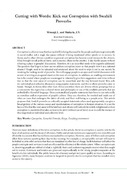| dc.description.abstract | Corruption is a thorny issue that has (and still) is being discussed by the people and features prominently in social media: not a single day passes without it being mentioned either openly or in secrecy. In Kenya and in other African countries in general, corruption has become a real menace to the citizens. It has brought social-political havoc and economic chaos to the country. A day hardly passes without it having a place in peoples’ discussions. Therefore, it is an issue that needs to be urgently addressed. The question that lingers is: how can we address corruption issues so that people view it as a national disaster? People need to be educated and awakened about the need to wipe it out in our society by invoking the ‘cutting words’ of proverbs. This will engage people in an open and fruitful discussion with an aim of arriving at an agreed stand on the issue of corruption. In addition, an enabling environment has to be created where people are encouraged to voluntarily give their suggestions and views without fear so that the root cause of corruption can be unearthed, and the way forward found. This calls for individual and collective discussion using popular statements, and this is where proverbs come in handy. Though, in Kenya (like other East Africa countries) there are diverse ethnic groupings but as a community the region has a shared vision and philosophy in use of the available proverbs that are embedded in Kiswahili language. These contextual and popular statements have been in use informally as custodian and an expression of people’s culture. They can, therefore, be invoked and made use of when an issue that endangers the fabric of unity and their well-being as a people arise. This article proposes that, Swahili proverbs as culturally accepted statements when used appropriately, can give a broad picture of the various causes and manifestations of corruption in Kenyan situation. It is on the basis of this that the root cause will be laid bare and citizens will not only be widely enlightened on how corruption is manifested but also on how to be alert (without use of force) so as to curb the menace of this magnitude at individual and collective level. | en_US |
